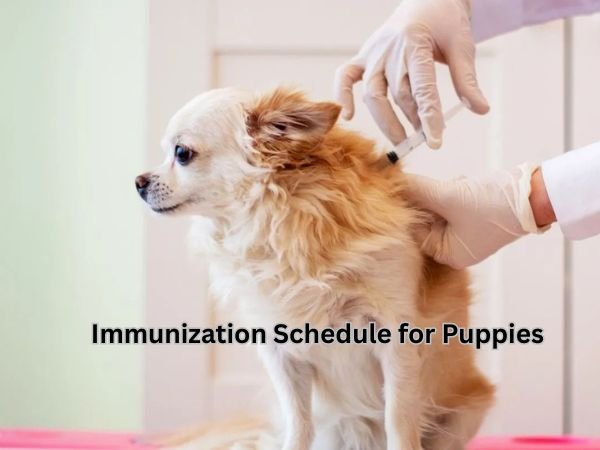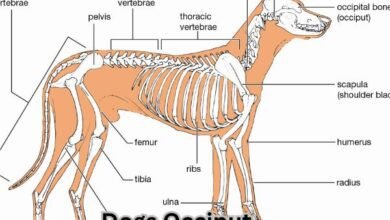
Bringing a new puppy home is an exciting and heartwarming experience, but it also comes with big responsibilities—especially when it comes to their health. One of the most important things you can do for your pup is to protect them from serious illnesses early on. That’s where the Immunization Schedule for Puppies comes in. By following a proper vaccination plan, you’re giving your furry friend the best chance at a long, healthy life. Vaccines help prevent life-threatening diseases like parvovirus, distemper, and rabies, which can be devastating for young dogs. As a responsible pet parent, staying on top of these essential shots isn’t just a smart move—it’s an act of love.
In this article, we’ll walk you through 7 life-saving vaccines every puppy needs and why timely immunization can make all the difference.
Why Puppy Vaccinations Matter
Bringing home a new puppy is an exciting and heartwarming experience. You want your furry friend to grow up healthy, strong, and full of life. One of the most important steps you can take to protect your puppy is following a proper vaccination schedule.
How Vaccines Protect Your Puppy
Vaccines help your puppy build resistance to dangerous diseases. They “teach” your puppy’s immune system how to recognize and fight off germs that can cause sickness.
- Prevent Deadly Diseases: Vaccinations protect against serious illnesses like:
- Parvovirus: Highly contagious and can be fatal, causing vomiting and bloody diarrhea.
- Distemper: Attacks the respiratory, digestive, and nervous systems, often leading to long-term problems or death.
- Rabies: Fatal to both pets and people and required by law in most areas.
- Protect Your Community: When your puppy is vaccinated, you’re also helping to keep other pets and people safe. This is called “herd immunity” and it’s especially important for very young, elderly, or immune-compromised animals.
The Risks of Skipping Vaccinations
Not sticking to the recommended vaccination schedule can have serious consequences.
- Severe Illness: Puppies are especially vulnerable to infection. Diseases like parvo and distemper can strike fast and be deadly.
- Costly Treatments: Caring for a sick puppy often means expensive vet bills, medication, and sometimes long hospital stays.
- Community Outbreaks: If too many pets go unvaccinated, diseases can spread rapidly and threaten entire neighborhoods.
- Legal Trouble: Skipping shots like rabies vaccination can result in fines or other penalties.
Imagine rushing your playful puppy to the vet because of sudden, severe illness. It’s heartbreaking, stressful, and often preventable with timely shots.
Core vs. Non-Core Vaccines: What’s the Difference?
Not every vaccine is needed for every puppy. Vaccines are split into two main groups:
Core Vaccines
These are considered essential for all puppies, no matter where you live.
- Parvovirus
- Distemper
- Adenovirus (canine hepatitis)
- Rabies
Core vaccines protect against diseases that spread easily and can be very serious or deadly.
Non-Core Vaccines
These are recommended based on your puppy’s risk factors—where you live, lifestyle, and travel plans.
- Bordetella (“kennel cough”)
- Leptospirosis
- Lyme disease
- Canine influenza
Your vet will guide you on whether these vaccines are needed for your puppy.
Making sure your puppy gets the right vaccines at the right time is one of the best ways to give them a happy, healthy life. If you have questions or concerns, talk openly with your veterinarian. They’re your partner in keeping your new best friend safe and well.
Immunization Schedule for Puppies
Keeping your puppy healthy starts with building a strong immune system—and that begins with the right vaccinations. Understanding the “why” and “when” behind each shot helps you make the best choices for your furry friend.
Understanding Puppy Immunity
When puppies are born, they get early protection from their mother. This comes in the form of maternal antibodies, which are passed on through the mother’s milk. These antibodies help defend against infections while your puppy is still very young, acting like a shield during the first few weeks of life.
But here’s the catch:
That shield doesn’t last forever. Maternal antibodies usually start to fade between 6 and 16 weeks of age, which means your puppy becomes more vulnerable to diseases. This is the reason vets often recommend starting vaccinations at 6-8 weeks, with boosters every few weeks until about 16 weeks old. This timing ensures your pup is protected exactly when their natural defenses are running out.
How Vaccines Build Immunity
Vaccines are a bit like practice drills for your puppy’s immune system. When your puppy receives a vaccine, their body gets a small, safe sample of the virus or bacteria—not enough to cause illness, but enough to teach their immune cells how to fight it. This training helps the immune system “remember” the real threat and react quickly if your puppy is ever exposed in the future.
Example:
- Think of it like a fire drill—your puppy’s body learns the emergency plan before there’s ever a real danger.
Common Misconceptions About Indoor Puppies
Some pet owners think, “My puppy stays indoors, so they don’t need all these shots.” It’s an understandable thought, but the truth is:
Dangerous germs can travel in on your shoes, clothing, or even through open windows. Puppies are curious and can get into all sorts of unexpected situations—like sneaking out the door or encountering unvaccinated pets.
Key reasons to vaccinate, even for indoor pups:
- Many diseases are airborne or live in the environment.
- Some viruses, like parvovirus, can survive on surfaces for months.
- Socialization classes, vet visits, grooming, and houseguests all pose exposure risks.
Actionable Advice for Puppy Parents
- Stick to Your Vet’s Schedule: Follow the vaccine plan your veterinarian lays out. Booster shots are essential to full protection.
- Keep Records: Track which vaccines your pup has received, and when.
- Ask Questions: Don’t hesitate to discuss your puppy’s lifestyle and risks with the vet. They can tailor the schedule to your dog’s needs.
- Be Patient: Immunity isn’t instant. It takes a couple of weeks after each vaccine for your puppy to build strong protection.
Giving your puppy the right start in life means protecting them from preventable illnesses. Stay proactive, follow the recommended immunization schedule, and enjoy all the adventures you and your healthy pup will have together!
Immunization Schedule for Puppies: Core and Lifestyle Vaccines
Bringing home a puppy is an exciting journey filled with love and laughter. One of the best ways to protect your furry friend is by following a proper vaccination schedule. Vaccines help keep your puppy healthy, happy, and ready for all the adventures ahead.
What Are Core Vaccines?
Core vaccines are essential shots that every puppy needs. These protect against common and dangerous diseases found all over the world.
Core Vaccines Include:
- Distemper
- Protects against a severe virus that affects the lungs, brain, and guts.
- Think of it as a strong shield against one of the most serious dog illnesses.
- Parvovirus
- Guards your puppy against a deadly stomach virus that causes vomiting and diarrhea.
- Puppies are especially at risk, so this vaccine is a must.
- Adenovirus (Hepatitis)
- Prevents infectious canine hepatitis, which can harm the liver and other organs.
- This virus spreads easily, and the vaccine keeps your puppy safe.
- Parainfluenza
- Helps stop a respiratory virus that causes coughing and sneezing.
- It’s one part of the “kennel cough” group.
- Rabies
- Protects against a fatal disease that can spread from animals to people.
- Required by law in many places and key for your pet’s safety.
Why Are These Vaccines Universally Recommended?
- These diseases are common, serious, and often life-threatening.
- Puppies everywhere—city or country—can be exposed.
- Vaccines offer strong protection and give peace of mind for you and your family.
What Are Non-Core (Lifestyle) Vaccines?
Non-core vaccines are given based on your puppy’s lifestyle, where you live, and what your dog does for fun. While not every puppy needs them, they’re important for dogs with certain habits or risks.
Non-Core (Lifestyle) Vaccines Include:
- Bordetella (Kennel Cough)
- Helps prevent a contagious cough, common in places with lots of dogs.
- Recommended if your puppy goes to dog parks, daycare, training classes, or boarding.
- Leptospirosis
- Protects against a bacterial infection from water, soil, or wild animals.
- Good for dogs who hike, swim in lakes, or live in rainy or rural areas.
- Lyme Disease
- Defends against a tick-borne illness that can cause joint pain and fever.
- Best for pups living where ticks are common or who enjoy wooded walks.
- Canine Influenza
- Protects against the dog flu, which spreads fast in dog-friendly places.
- Consider if your pup visits boarding kennels, groomers, or crowded events.
When Are These Vaccines Recommended?
- If your puppy is an adventurer, likes meeting other dogs, or explores the outdoors, talk to your vet about non-core vaccines.
- Your veterinarian can help you decide based on your puppy’s lifestyle, local risks, and travel plans.
Takeaway for Pet Owners
- Keep to your vet’s recommended vaccination schedule—most start at 6 to 8 weeks old.
- Booster shots are needed to stay protected, so don’t skip appointments!
- Regular checkups and the right vaccines mean more wagging tails and happy memories.
Protecting your puppy with the right vaccines gives them the best start in life and keeps the tail wags coming for years to come.
Puppy Vaccine Schedule: When and What to Expect
Bringing a new puppy home is exciting, and making sure they stay healthy is a top priority. One of the best ways to protect your pup from serious diseases is through timely vaccinations. Understanding the puppy vaccination timeline helps you know what shots your little friend needs and when. Here’s a simple, week-by-week guide to the first-year puppy vaccinations that you can expect.
6–8 Weeks: The First Vaccines
Your puppy’s immune system is just getting started. At this stage, the focus is on protecting against the big threats:
- DHPP vaccine (Distemper, Hepatitis, Parvovirus, Parainfluenza)
- Sometimes, Bordetella (kennel cough) if your vet thinks your pup will be around many other dogs soon
This first round is crucial because these illnesses can be serious or even deadly.
10–12 Weeks: Boosting Immunity
As your puppy grows, boosters are needed to keep their protection strong. At this stage, your vet may recommend:
- DHPP booster
- Vaccines for Leptospirosis, Lyme disease, and Influenza (depending on risk factors and location)
- Another Bordetella shot if needed
Each booster helps build a strong shield against infections.
14–16 Weeks: Final Puppy Shots
These weeks deliver some important last vaccines for puppies:
- Final DHPP booster
- Rabies vaccine — usually required by law and critical for safety
- Possible boosters for Lyme and Influenza
This stage sets your puppy up with solid immunity for their first year.
12–16 Months: One-Year Boosters
By now, your puppy is almost a young adult. To keep them healthy:
- Boosters for DHPP and Rabies
- Bordetella and Leptospirosis boosters if your vet recommends
Adult vaccination schedules will be based on this foundation.
Tips for a Smooth Puppy Shot Schedule
- Always consult your veterinarian — they tailor the schedule to your puppy’s health, lifestyle, and local risks.
- Puppies starting vaccines late or with unknown history might follow a different plan.
- Keep vaccination records handy — they’re essential for travel, boarding, and emergencies.
- Watch for any side effects after shots, like mild fever or soreness. Contact your vet if you notice anything unusual.
By following this puppy shot schedule, you’re giving your new best friend a healthy start with strong protection against many dangerous diseases. Vaccinations are an act of love that builds trust with your vet and confidence for you as a pet parent. Here’s to a happy, healthy puppy journey!
Puppy Vaccination Aftercare and Tips
Bringing home a new puppy is such an exciting time! Along with all the fun and cuddles, keeping your puppy healthy is very important. Vaccinations play a big role in protecting your furry friend from serious diseases. Here’s what you need to know about puppy vaccination aftercare and some helpful tips to keep your puppy safe and happy.
What to Expect After Each Shot
After your puppy gets a shot, it’s normal to see some mild side effects. Don’t worry—these usually go away quickly.
Common side effects include:
- Slight soreness or swelling where the shot was given
- Mild tiredness or sleepiness
- Low-grade fever
- Loss of appetite for a few hours
If your puppy seems very sleepy, refuses to eat for more than a day, or has swelling that gets worse, call your vet right away.
How to Comfort Your Puppy:
- Create a calm, quiet space for rest
- Offer gentle petting and soothing words
- Give plenty of fresh water
- Avoid strenuous play for at least 24 hours
Your puppy will appreciate your care and attention!
When Is It Safe to Go Outside?
You might be eager to take your puppy on adventures like walks or hikes. But it’s important to wait until vaccinations have built enough protection.
Here’s a general guideline:
- Avoid public parks, doggy daycare, or places with many dogs until at least two weeks after the last round of puppy shots.
- If you want to take your puppy hiking or explore nature, pick quiet trails where fewer dogs visit.
- Always keep your puppy on a leash and away from unknown dogs until fully vaccinated.
Vaccinations help your puppy fight off dangerous germs, so timing is key to keep outdoor fun safe. Early socialization is important but always balance it with health protection.
Keeping Up With Booster Shots and Annual Vaccinations
Puppy vaccines usually come in a series over several weeks. Once your puppy finishes the initial shots, don’t forget:
- Schedule booster shots as your vet recommends, often at one year old.
- After the first year, most dogs need yearly or every three years’ boosters to stay protected.
- Set reminders on your phone or calendar to keep your puppy’s vaccines up to date.
Regular boosters are like keeping your puppy’s immune system tuned up for a long, happy life.
Special Considerations: Traveling, Hiking, and Lifestyle
When it comes to raising a happy, healthy puppy, immunizations play a big role. But did you know that your puppy’s lifestyle can affect which vaccines they need? If your furry friend loves to travel, go hiking, or spend time at dog parks and boarding facilities, certain non-core vaccines become especially important.
Which Non-Core Vaccines Matter for Active Puppies?
Non-core vaccines aren’t required for every puppy but can be essential depending on what your puppy does and where they go. Here are three key vaccines to consider for pups with adventurous lifestyles:
- Bordetella (Kennel Cough Vaccine):
Puppies who visit dog parks, boarding centers, or groomers are at risk of catching kennel cough. Bordetella is a highly contagious respiratory infection, so this vaccine helps protect your pup from a nasty, persistent cough. - Leptospirosis:
This bacterial infection spreads through water contaminated by wildlife urine. If you hike near lakes, streams, or live in areas with lots of wildlife, this vaccine is important. It helps prevent serious kidney and liver damage. - Lyme Disease:
Lyme disease is transmitted by ticks, which are common in wooded or grassy areas. Hiking, camping, or walking in tick-prone regions means the Lyme vaccine can provide crucial protection against this painful illness.
Before You Hit the Trails: Preparing Your Puppy for Outdoor Adventures
Getting outside is wonderful for your puppy’s mind and body. But a little planning goes a long way to keep them safe:
- Check Vaccinations First:
Make sure your puppy is up-to-date on all vaccines, especially the non-core ones if you’ll be hiking or traveling. - Visit the Vet for a Health Check:
Before any big trip or boarding stay, a quick vet visit ensures your puppy is fit and ready. - Prepare Prevention Supplies:
Bring tick prevention products, clean water, and a well-fitted collar with ID tags. - Start Slow:
Build your puppy’s outdoor experience gradually to avoid stress and fatigue.
Conclusion
Following a thoughtful immunization schedule is one of the best gifts you can give your puppy. It keeps them safe, healthy, and ready for all the adventures life has to offer. Always chat with your veterinarian to tailor vaccines to your puppy’s unique lifestyle. Regular check-ups and vaccinations don’t just protect your dog—they bring peace of mind, helping you enjoy many joyful years together.
FAQ
What happens if my puppy misses a shot?
If your puppy misses a shot, call your vet right away. They may need to restart the vaccine series. Delays can leave your puppy unprotected from serious diseases like parvo or distemper.
How much do puppy vaccinations cost?
Puppy vaccines usually cost between $75 and $150 for the full set. Prices may vary by location and vet. Some animal shelters or clinics offer low-cost vaccine programs.
Do indoor puppies need all vaccines?
Yes, indoor puppies still need vaccines. Diseases like parvo or rabies can spread through people, objects, or other pets. Vaccines help keep your puppy safe, even if they stay indoors most of the time.
Can vaccines cause side effects?
Yes, mild side effects like soreness, tiredness, or a small lump are normal. Serious reactions are rare. If your puppy has trouble breathing or swelling, call your vet right away.
When can my puppy safely socialize or go outside?
Your puppy can start going outside and meeting other dogs safely about one to two weeks after their final round of core vaccines, usually around 16 weeks old. Always ask your vet to be sure.



